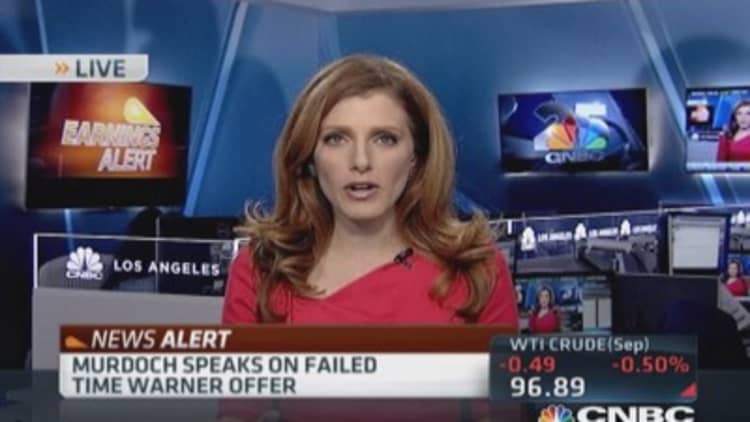Thanks to Rupert Murdoch's recent overture, Time Warner shares have traded more on drama than fundamentals. Now that he has dropped the approach for good, investors will need to face reality.
Shares of Time Warner plunged about 13 percent Wednesday after Murdoch's Twenty-First Century Fox withdrew its bid for the rival media conglomerate on Tuesday. Time Warner shares had surged a few weeks earlier after Murdoch made an $80 billion offer to the company.
Wednesday's decline gave back much of those gains. At the current price of about $75 a share, the stock remains a few dollars above levels before Murdoch appeared, suggesting some hope that he'll come back around.
Yet, it's probably time to set aside dreams of deals. On a conference call to discuss Fox's earnings Wednesday evening, Murdoch emphasized that he had made a "resolute decision" to walk away and Fox COO Chase Carey said the company is "done" with the pursuit of Time Warner.
Furthermore, there is "no discussion" among Murdoch and Fox executives of contemplating another bid, according to a person familiar with the matter. While Fox was willing to pay more than the original price it indicated, a chasm has remained between what Murdoch would pay and what Time Warner wanted, the person said. There has been no sign of any other suitors, either, the person added.
Spokespeople for Fox and Time Warner both declined to comment for this article.

Beyond the latest deal drama, Time Warner will need to support its stock by adopting a strategy the company hasn't embraced in some time: operational growth.
For much of the last decade, Time Warner has managed to generate healthy growth in earnings per share, but has shed assets and reduced revenue. The company's sales peaked at $47 billion in 2008, and analysts expect them to total $27.8 billion in 2014.
And there simply aren't many assets left to unload. The company spun off Time Warner Cable in 2007, Web services company AOL in 2009, and Time Inc., its magazine division, earlier this year. The remaining assets essentially consist of media content companies that look better together than apart: pay-TV network HBO, the Warner Bros. movie studio, and the Turner networks division, whose networks include TNT, TBS, and CNN.
Time Warner may soon face pressure from consolidation among the companies that buy Time Warner's content. The pending mergers of CNBC parent Comcast and Time Warner Cable, along with AT&T and DirecTV, will give those distributors more negotiating leverage when dealing with content companies. Without the added heft of the Fox networks, Time Warner may have a harder time negotiating carriage fee increases against the larger distribution companies in coming years.
The Turner division is also battling weak ratings at its major networks. Advertising revenue rose just 1 percent for the division in the second quarter, and it's hard to guess when programming investments will pay off.
And yet, Time Warner shares trade at 17.1 times consensus forward earnings, according to FactSet. That's among the highest—essentially a pricier stock—among its peer group, with Viacom trading at 13 times, CBS at 15.6 times, and Fox at 18.3 times the five-year average.
There are ways Time Warner can grow into its higher valuation. One is to squeeze more income out of the company's existing content by selling it to a new generation of buyers such as Netflix and Amazon. Earlier this year, HBO agreed to license some high-profile programs such as "The Sopranos" and "The Wire" to Amazon. While HBO will want to be careful that such content doesn't wind up competing with shows on its own network, there's probably more it can do. Rival CBS got into the digital licensing game more aggressively a few years ago and continues to increase such revenue.
Other means of expansion could be riskier. On an earnings call Wednesday, Time Warner suggested it has room to grow in consumer products. That could mean selling toys based on characters from DC Comics, just as Disney has done with its properties. But such moves are easier said than done. DreamWorks Animation, for instance, has tried to boost its business with toy sales but that strategy has barely moved the needle.
Time Warner's TV networks probably have room to run overseas, but getting them there will take time. Unlike Discovery Communications, whose nature shows tend to have international appeal, much of Time Warner's TV content is best suited to a domestic audience. One notable exception is children's programming on Turner's Cartoon Network, which may resonate well across countries.
All that isn't to say that Time Warner's content isn't valuable. HBO, Warner Bros. and Turner remain some of the most coveted properties in the industry. But for the stock to hang onto its premium multiple, Time Warner will have to prove it can grow.

—CNBC's John Jannarone
CORRECTION: Analysts expect Time Warner's sales to total $27.8 billion in 2014. That figure was incorrect in an earlier version of this article.

